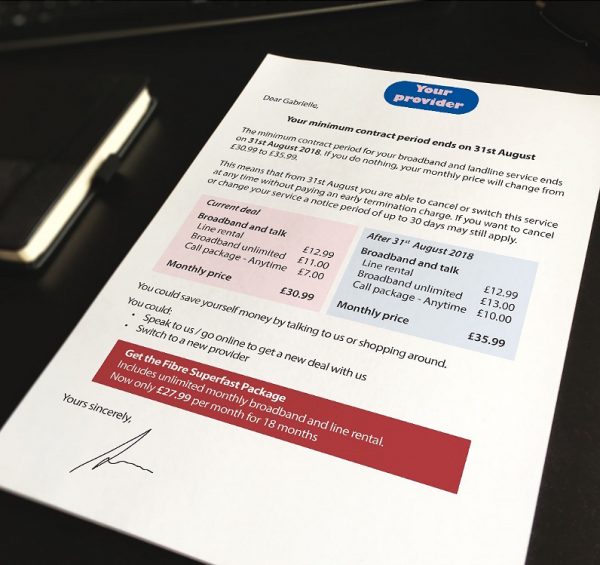End of Contract Letters by UK Broadband ISPs Boost Re-Contracting

Ofcom has today posted some additional analysis on the impact of their End-of-Contract Notifications (ECN) system, which reveals that customer re-contracting on major broadband ISPs has increased as a result of its introduction – varying from a rise of 13% on Plusnet to just 3% on TalkTalk.
The regulator’s ECN system – as first introduced in February 2020 – requires all fixed broadband, mobile, home phone and pay TV providers to issue such notifications to existing subscribers at the end of their term (sent by text, email or letter). The move was intended to help tackle the so-called “loyalty penalty” by keeping customers informed about the best deals on their current provider and encouraging switching.
The additional analysis published today is intended to complement Ofcom’s previous November 2021 review (here), which among other things found that the proportion of broadband customers who switched or re-contracted three months prior to or three months after their minimum contract period ended increased from 47% in July 2019 to 62% in September 2020.
Advertisement
In the new update, Ofcom used data provided to them by broadband ISPs to measure the impact of their ECN policy intervention on: 1) the rate at which customers re-contract at the end of their minimum contract period, and 2) the prices broadband customers paid after re-contracting in response to an ECN.
Econometric analysis – Percentage point increase in re-contracting due to ECNs
Plusnet 13%
Sky Broadband 8%
BT 10%
TalkTalk 3%
Virgin Media 10%
EE 10%
Econometric analysis – Price effects of re-contracting in response to receiving an ECN
(the average monthly price differences for those who responded to an ECN)Plusnet = Statistically insignificant effect
Sky Broadband -£9.26
BT £2.45
TalkTalk £7.81
Virgin Media -£7.74
EE = Statistically insignificant effect
Clearly, re-contracting customers with some communication providers paid lower prices, and higher prices with others. Naturally, those who re-contract can’t always expect to get a cheaper price than they currently pay for their existing service, which is because prices often rise each year, and you’ll usually only re-contract at the end of a longer 18-24 month term. But it may still save you money vs not re-contracting at all (post-contract pricing), although others may prefer to switch ISP if it doesn’t.
“Overall, our latest analysis provides further evidence that ECNs increased re-contracting among broadband customers after the ECNs came into effect in February 2020, and we can attribute some of the increase in re-contracting in the broadband market directly to the ECN policy, rather than external factors,” added Ofcom.
Mark is a professional technology writer, IT consultant and computer engineer from Dorset (England), he also founded ISPreview in 1999 and enjoys analysing the latest telecoms and broadband developments. Find me on X (Twitter), Mastodon, Facebook, BlueSky, Threads.net and Linkedin.
« Broadband ISP BT Add Xbox Game Pass to FTTP Broadband Plans




















































they just need to sort out the yearly price increase that happened to me a couple of months after taking out a new contract (even if i had moved it would have happened). they should at a minimum only yearly price increase on the anniversary of a contract. turns out the new customer price is now cheaper than what was offered at the time plus yearly hike, they tried to say it would be the same.
i would prefer it that we are all treated equally when taking out a contract and yearly price only applied on the anniversary.
I work for a broadband sales and recontract team. The team I work for can recontract someone at any time in their contract meaning if there is a lower price they can get it. I know some agents in departments other than the recontracting department think you have to wait to the end of your fixed term, bit there isn’t really as you are committing to another contract meaning you are willing to stay longer. Maybe even pretend you are going to cancel your services to see if you can get a lower deal
@Stuart I was talking about the in contract yearly price increases you can’t avoid… even if you get a deal, the yearly 3.9%+CPI/RPI come along and gets you.
I was proposing that they only apply it on the anniversary of a contract, rather than join in March one a deal to find in April you got stung… whereas someone joining in May could avoid it and get a slightly better deal, as the 3.9%+CPI/RPI on the existing is higher than the new offer.
@Stuart I was talking about the in contract yearly price increases you can’t avoid… even if you get a deal, the yearly 3.9%+CPI/RPI come along and gets you.
I was proposing that they only apply it on the anniversary of a contract, rather than join in March one a deal to find in April you got stung… whereas someone joining in May could avoid it and get a slightly better deal, as the 3.9%+CPI/RPI on the existing is higher than the new offer.
The yearly consumer price index bump shouldn’t be allowed. I know they all have it contracted in now but it should be stopped.
You agree to pay £x.xx a month for y months. If they want to increase the price to keep up with inflation then they can do that at y + 1 months.
That prices change isn’t the consumers problem. They should move to 12 month maximum terms and then increase based on inflation then, giving consumers the chance to opt out and move providers.
Locking the price increase into the contract is anti-consumer.
Indeed, they would be better restricting price rises to inflation or none at all, ISPs should have a choice of short contracts with rises or long contracts with none, but ofcom have given them both.
One of the better things Ofcom have done I must admit, I wonder how many people were paying prices they did not need to pay before it came in.
So ofcom think the retention deal thing is good? It just means those not on the deals pay more to subsidise it and have to haggle every time contract ends.
Haggling have been happening for centuries. That is the way things are, i agree it would be nice if we did not have to, but if you want a good offer, then it needs to be done.